| Wednesday, April 9, 2003 |  |
|
|
|
Lee Felsenstein is an Internet oldtimer and activist. Here's a thing from his weblog:"HOW TO MAKE A REVOLUTION in three easy steps
OK, here's the method for making sweeping, positive social change.
FIRST, everybody gets a project.
Join one or start one, but the project has to be directed toward making things better. That's what's called a "positive vector".
SECOND, everybody talks with everybody else about their projects.
That's "talks with", not just "talks to" or "talks at". This sets up a "field of communication", with information flowing in all directions. It's very important to the process, and we now have the tools (the Internet and the phone system) to make communication available without much hierarchy.
THIRD, be prepared to change your project based upon what you learn by communicating about it.
This is also very important. It "closes the feedback loop" by making the communication consequential, and, with everyone's good sense, sets up a "converging system" in the general direction of the vector.
That's it. Act, especially in concert with others, communicate and re-evaluate. Repeat as often as possible. Oh, yes - keep records of what you try and what happened , both good and bad. The system needs an element of memory to function. " OK. Organization based on each person actually having something meaningful to do, and on a process of continuous dialogue.
[ Organization | 2003-04-09 23:59 | | PermaLink ] More >
|
|
| Tuesday, April 8, 2003 |  |
|
|
|
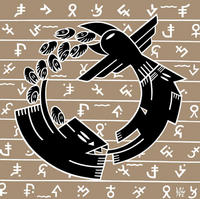 Jim Moore elaborating on his Second Superpower meme: Jim Moore elaborating on his Second Superpower meme:"How do we strengthen the Second Superpower? What are the next vital developments we need to make? Are there one or two things which, if accomplished, would enable more rapid and fuller evolution of emergent democracy and the second superpower? Are these spiritual, technical, political, or in our collective mindset?
In ecology there is a sub-field called "assembly rules" that seeks to understand the combinations of species that are required for a functioning ecosystem. The field goes farther and looks for the sequences by which a few species can establish a foundation on which others can grow. Aspen trees stabilize nitrogen in the soil, making a place for hardwoods to follow. Lichens break down volcanic rocks into a primitive soil, mosses and ferns follow.
I wonder, what are the assembly rules for emergent democracy?" Ah, yes, yes, that's the kind of questions we need to delve into. Recipes for generative diversity.
[ Organization | 2003-04-08 23:00 | 0 comments | PermaLink ]
|
|
| Sunday, April 6, 2003 |  |
|
|
|
George Por says:" What a delight! after writing about multi-membership here and there, I've just discovered Sébastien Paquet's concept of "community straddling" in a brief but germinal essay on Online Communities and the Future of Culture. A "community straddler is someone who participates in several communities, be it simultaneously or sequentially, and who understands the culture of each to a certain extent." Seb also says:These people do not feel irrevocably bound to a particular community. They see themselves as multidimensional: as opposed to saying "I'm a doctor, don't expect me to teach you anything" or "I'm just a programmer, don't bug me with politics", they'll say "Well, right now I'm into this and that and that, and if you have something new to show me I just might take a plunge!" As humankind's collective intellect--reflected to some extent on the web--became the most powerful force of production of our times, multi-community membership and the corresponding multi-dimensional evolution of human faculties, became harbingers of cultural and economic transformation much more profound and broader than we've ever had a chance to experience. George also pointed out in an e-mail today the leverage found in the ability to speak multiple languages, in terms of collective intelligence. American supremacy made the world learn English. But now there probably are more people who speak two or more languages in Europe than in the U.S. More people who are fluent in straddling multiple cultures.
This is all important, I think. Will become increasingly important. People who act as neurons between cells that otherwise wouldn't be connected, because they speak different languages or have different world views or specialize in different areas.
[ Organization | 2003-04-06 22:13 | | PermaLink ] More >
|
|
| Friday, April 4, 2003 |  |
|
|
|
 Britt has an excellent post, Sitting in the Counting House, referencing a post by Ross Mayfield that notes how the presence of counting tools change the game. When coins were introduced in market places, new things became possible. Now, with the prospect of introducing reliable ratings into economic transactions, it might change things significantly. Now Britt says some good things like: Britt has an excellent post, Sitting in the Counting House, referencing a post by Ross Mayfield that notes how the presence of counting tools change the game. When coins were introduced in market places, new things became possible. Now, with the prospect of introducing reliable ratings into economic transactions, it might change things significantly. Now Britt says some good things like:"We need to get our hands around the choke point that's preventing the right things from being counted. I suggest that the check point is who controls the data and thus the character of the data kept. We assume that data is always kept by the seller, but is that so?
Consider this:- Whenever a seller and a buyer intersect, the data is maintained by the seller, as we expect.
- Whenever an employer and an employee intersect, the data is maintained by the employer. (Who is the buyer of the services.)
In the first case, the data keeper is the seller, not the customer. In the second, though, the keeper of the data is the customer, purchasing the employee's work. So it's not about the roles of the players, It's about size and who is the designer of the transaction. Data is the asset of the designer of the business agreement, and a liability to the other party to the agreement, who's subservient to the keeper's records.
I emphasize designer of the transaction because transactions are designed ad hoc, one-at-a-time, like component parts in machines before Eli Whitney invented standardized parts. Perhaps our economy has become too complicated to let transactions be designed for the sole benefit of whoever thinks it up first and has superior data resources." Excellent observations, and then this core point:Proprietary Data is the Basis of Tyranny Yep. So the advantage is usually with the people who decide what data is captured and how, and who control access to that data. That explains a helluva lot of things about our society. Even the money system is based on that, by making sure that the information called dollars and cents can only be created according to certain rules, designed by those who have the most to gain from them. And media companies with eternal copyrights - same thing. And governments who allow themselves to gather information that the rest of us aren't allowed to look at.
The action item for us is to figure out how to count things that aren't counted, in regards to the quality and history of many things, and the activities of people and companies, and to make that data easily available and impossible to hide. If good, reliable data is widely and freely available, that allows us to make informed decisions on who and what to deal with, and who and what to avoid - it is going to be very hard to try to force us to do anything less.
[ Organization | 2003-04-04 19:01 | 0 comments | PermaLink ]
|
|
|
|
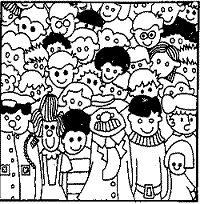 Jim Moore has an excellent article: The Second Superpower Rears its Beautiful Head and a new weblog. Jim Moore has an excellent article: The Second Superpower Rears its Beautiful Head and a new weblog."As the United States government becomes more belligerent in using its power in the world, many people are longing for a "second superpower" that can keep the US in check. Indeed, many people desire a superpower that speaks for the interests of planetary society, for long-term well-being, and that encourages broad participation in the democratic process. Where can the world find such a second superpower? No nation or group of nations seems able to play this role, although the European Union sometimes seeks to, working in concert with a variety of institutions in the field of international law, including the United Nations. But even the common might of the European nations is barely a match for the current power of the United States.
There is an emerging second superpower, but it is not a nation. Instead, it is a new form of international player, constituted by the "will of the people" in a global social movement. The beautiful but deeply agitated face of this second superpower is the worldwide peace campaign, but the body of the movement is made up of millions of people concerned with a broad agenda that includes social development, environmentalism, health, and human rights. This movement has a surprisingly agile and muscular body of citizen activists who identify their interests with world society as a whole—and who recognize that at a fundamental level we are all one. These are people who are attempting to take into account the needs and dreams of all 6.3 billion people in the world—and not just the members of one or another nation. Consider the members of Amnesty International who write letters on behalf of prisoners of conscience, and the millions of Americans who are participating in email actions against the war in Iraq. Or the physicians who contribute their time to Doctors Without Borders/ Medecins Sans Frontieres.
While some of the leaders have become highly visible, what is perhaps most interesting about this global movement is that it is not really directed by visible leaders, but, as we will see, by the collective, emergent action of its millions of participants." Great stuff. This article has gotten quite some attentionon the net in the past few days, and the meme seems to be taking hold. Moore somewhat equates the power he's talking about with the peace movement, which probably isn't necessary, although it is a good example. The key point is that there's a new mechanism at play here."Thus the new superpower demonstrates a new form of "emergent democracy" that differs from the participative democracy of the US government. Where political participation in the United States is exercised mainly through rare exercises of voting, participation in the second superpower movement occurs continuously through participation in a variety of web-enabled initiatives. And where deliberation in the first superpower is done primarily by a few elected or appointed officials, deliberation in the second superpower is done by each individual—making sense of events, communicating with others, and deciding whether and how to join in community actions. Finally, where participation in democracy in the first superpower feels remote to most citizens, the emergent democracy of the second superpower is alive with touching and being touched by each other, as the community works to create wisdom and to take action." Count me in. Moore's article naturally also attracted some flak on the net. I'm not going to link to the few people who didn't like it. But it is always interesting to see who feels very threatened by subjects such as freedom, openness, self-organization, collective consciousness, leaderless organization, and that kind of thing."Which brings us to the most important point: the vital role of the individual. The shared, collective mind of the second superpower is made up of many individual human minds—your mind and my mind—together we create the movement. In traditional democracy our minds don’t matter much—what matters are the minds of those with power of position, and the minds of those that staff and lobby them. In the emergent democracy of the second superpower, each of our minds matters a lot. For example, any one of us can launch an idea. Any one of us can write a blog, send out an email, create a list. Not every idea will take hold in the big mind of the second superpower—but the one that eventually catches fire is started by an individual. And in the peer-oriented world of the second superpower, many more of us have the opportunity to craft submissions, and take a shot." Finally Moore proposes a bit of the HOW in how we get there:"First, we need to become conscious of the "mental processes" in which we are involved as members of the second superpower, and explore how to make our individual sense-making and collective action more and more effective. This of course means challenging and improving the mass media, and supporting more interactive and less biased alternatives. But more ambitiously, we will need to develop a kind of meta-discipline, an organizational psychology of our community, to explore the nature of our web-enabled, person-centered, global governance and communication processes, and continue to improve them." It is all quote obvious, of course. Of course WE, the people of this planet, are the real power here. It is only because we're badly organized, badly informed, and communicating badly, that a very, very small percentage of us, who are better organized, can drag the rest of us around by the nose. What is going to change all of it is a form of organization that will ONLY work for all of us, and that will be of no use for the old power elite. You can call it self-organization, emergent democracy, the transparent society, the global brain, or whatever, but it is sure to make the old structures become gradually irrelevant once we get a better sense of it. It is a huge threat to the power elite, and to the traditional superpower(s), but the kicker is that it really makes no sense to them, so they will probably not succeed in suppressing it. They will try, but those attempts will look increasingly obvious and strange.
[ Organization | 2003-04-04 13:38 | | PermaLink ] More >
|
|
| Monday, March 31, 2003 |  |
|
|
|
 Marshall Sahlins is the author of Stone-Age Economics, which is an interesting read, in part about gift economies and how pre-historic economic systems weren't as miserable as they're commonly believed to be. Here is something from the article The Original Affluent Society: Marshall Sahlins is the author of Stone-Age Economics, which is an interesting read, in part about gift economies and how pre-historic economic systems weren't as miserable as they're commonly believed to be. Here is something from the article The Original Affluent Society:"There are two possible courses to affluence. Wants may be "easily satisfied" either by producing much or desiring little The familiar conception, the Galbraithean way- based on the concept of market economies- states that man's wants are great, not to say infinite, whereas his means are limited, although they can be improved. Thus, the gap between means and ends can be narrowed by industrial productivity, at least to the point that "urgent goods" become plentiful. But there is also a Zen road to affluence, which states that human material wants are finite and few, and technical means unchanging but on the whole adequate. Adopting the Zen strategy, a people can enjoy an unparalleled material plenty - with a low standard of living. That, I think, describes the hunters. And it helps explain some of their more curious economic behaviour: their "prodigality" for example- the inclination to consume at once all stocks on hand, as if they had it made. Free from market obsessions of scarcity, hunters' economic propensities may be more consistently predicated on abundance than our own." Sahlins explains how typical hunter-gatherers work 3-5 hours per day on acquiring food, and they have plenty of time for leisure. For that matter, they have a schedule that most civilized people would be sort of envious about. The more 'civilized' we become, the harder we tend to work, and the less time we have for leisure. He also makes some interesting distinctions between primitive living and poverty. In hunter-gatherer cultures starvation would be pretty much unthinkable."The world's most primitive people have few possessions. but they are not poor. Poverty is not a certain small amount of goods, nor is it just a relation between means and ends; above all it is a relation between people. Poverty is a social status. As such it is the invention of civilisation. It has grown with civilisation, at once as an invidious distinction between classes and more importantly as a tributary relation that can render agrarian peasants more susceptible to natural catastrophes than any winter camp of Alaskan Eskimo." I'm not sure what we can learn here, other than that it is possible to successfully live very simply and modestly. There must be some kind of point that applies also to a technological civilization. A just-in-time kind of thinking. We could very well arrange our world so that nobody ever has to starve and so we only work a few hours per day. From what I hear, only 2-3 percent of our work relates to actual production, and from my own observation, the majority of human work is inefficient or unnecessary, just arranged to keep people busy. So, why can't we have a an efficient and productive, but leisurely and relaxed, high tech society, where it would be unthinkable that basic needs wouldn't be filled?
[ Organization | 2003-03-31 06:18 | | PermaLink ] More >
|
|
| Saturday, March 29, 2003 |  |
|
|
|
Chris Corrigan mentioned an article, an interview with Eric Bonabeau about Swarm intelligence."Human beings suffer from a "centralized mindset"; they would like to assign the coordination of activities to a central command. But the way social insects form highways and other amazing structures such as bridges, chains, nests (by the way, African fungus-growing termites have invented air conditioning) and can perform complex tasks (nest building, defense, cleaning, brood care, foraging, etc) is very different: they self-organize through direct and indirect interactions.
In social insects, errors and randomness are not "bugs"; rather, they contribute very strongly to their success by enabling them to discover and explore in addition to exploiting. Self-organization feeds itself upon errors to provide the colony with flexibility (the colony can adapt to a changing environment) and robustness (even when one or more individuals fail, the group can still perform its tasks).
With self-organization, the behavior of the group is often unpredictable, emerging from the collective interactions of all of the individuals. The simple rules by which individuals interact can generate complex group behavior. Indeed, the emergence of such collective behavior out of simple rules is one the great lessons of swarm intelligence.
[...]Solutions to problems are emergent rather than predefined and preprogrammed. The problem is that you don't always know ahead of time what emergent solution will come out because emergent behavior is unpredictable. If applied well, self-organization endows your swarm with the ability to adapt to situations that you didn't think of. This approach has proven itself in a number of situations, ranging from network routing to factory scheduling to supply chain optimization to controlling groups of UAVs (Unmanned Aerial Vehicles). But it does require a drastic shift in mindset.
[...]However, we're reaching a stage in technology where you no longer have a choice: your mindset has to change or you'll be screwed. It's no longer possible to use traditional, centralized, hierarchical command and control techniques to deal with systems that have thousands or even millions of dynamically changing, communicating, heterogeneous entities. I think that the type of solution swarm intelligence offers is the only way of moving forward, you have to rethink the way you control complex distributed systems."
[ Organization | 2003-03-29 12:39 | | PermaLink ] More >
|
|
|
|
 Britt speaks about money velocity and gift economies. Britt speaks about money velocity and gift economies."Money velocity is a big deal, but only economists talk about it. I'm no economist, but I know what I like. Money velocity measures how many times the average dollar changes hands in a year. The GDP measures all the transactions we do in a year. When we get a dollar, we spend that dollar, which gets measured as a $2 addition to the GDP. If consumers and businesses feel confident, they spend money faster and the GDP goes up and we proclaim ourselves successful, If we hang on to our dollars a little longer, we're less successful. I don't know what the current figures are, but I recall money velocity being about 12-14 times a year when I took my single Econ course. (Obviously, you should look elsewhere for your economic insights.) The calculation is made by dividing the money supply (no simple calculation, that) into the GDP. If money's zinging around the economy at the rate of 1 move per month (12 per year) and it slows by just a day, the GDP drops by 3%, which is a big deal. It gives us an idea why the consumer confidence rating is so important. It's safe to assume that money velocity was higher in 1999 than it is now, and that difference may account for the relative weakness in the economy." If everybody feels confident or abundant or generous, money is loose, flowing from hand to hand easily. That feels a bit like a gift economy. So, hm, what stops us from having that right now?
It seems sort of logical and obvious that if we just speed things up and pass the money around faster, it can buy all of us what we want along the way, as long as it is available. The same dollar, or the same million can be passed around hundreds of times in a year, or a month, or a day, and buy each temporary owner a million dollars worth of stuff, by passing the token on to somebody else, who then in turn can buy a million dollars of something else, etc. So what's wrong? Why is it moving so slowly? Why aren't we just passing large amounts around all the time and buying lots of fun things?
One reason I can think of is taxes. If you have to pay a sizable cut to a third party whenever you exchange value, that slows down the fun drastically. But that mostly applies to private people. A business doesn't directly pay tax from buying and selling stuff that is part of the business. So that shouldn't really stop businesses from moving money very rapidly.
Is there not enough money in existence for us to feel confident in being able to move it around loosely? There might be a bit of a problem there, but in principle, if we move it rapidly enough, it will seem to function as much more than it is. You can increase the money supply by just moving it very quickly.
But how about if you don't know who to trade with? If you don't know very well what is available out there, and particularly if you don't know how good it is. Then you'll spend a considerable amount of time and effort looking for what you want, and trying to ascertain whether it is of good quality, whether you can trust the people you'll get it from, and whether it will be worth it. And frequently you'll make a mistake, because of lacking information, and you'll get less than you paid for. All of that slows you down and makes you reluctant and slow at moving money. And since most everybody else is having the same problem, they'll be reluctant and slow at giving you any money.
Superior information accelerates money. Bad information slows it down.
Traditional corporations put a lot of resources into producing good looking bad information, and in suppressing the distribution of the good information.
A relatively small network of people providing excellent information about what they offer and what they need, and how good it is, and a fast and reliable way of carrying out transactions - such a network could conceivable compete favorably with huge corporations that run on slow moving deception.
[ Organization | 2003-03-29 12:39 | 0 comments | PermaLink ]
|
|
| Tuesday, March 18, 2003 |  |
|
|
|
 I was reading this quote from an article called Leaderless Resistance Today: I was reading this quote from an article called Leaderless Resistance Today:"The new communications technologies make it possible for a movement to exist solely as an ideology, with no membership lists, no financial records, no direct communication between the operatives — and no "off" switch. There is no way to negotiate with such an ideology, no way to compromise.
...Because there is no formal "group" with assets, interpersonal relationships, or other stabilizing factors, individuals who moderate simply leave the milieu; their writings and actions remain behind, recruiting new members." ..and I was thinking "Yeah, that's fabulous, that's the kind of stuff we need!!", when I actually looked at the article and realized it was about terrorist groups and dangerous elements in society, and how movements might continue, simply based on an ideology, a book, a website, an event, even without any organizing network, without an organization, without any leaders. And the article talks about how that is a very bad thing, and how we might stop that. But I'm looking for how we might start that. Oh, not focused on hate and violence as the article is talking about. Focused on truth, freedom, beauty, love, the common good. Imagine that there were nothing any frantic monopoly could do to stop people from spontaneously making things work better and being more fun, and from exposing the truth at every turn. No organizational leadership to buy off, no accounts to bankrupt, nobody to put in jail, no communication channels to cut. Just millions of people who freely and voluntarily operated as cells of a bigger body, without even having to talk about it. Heheh.
[ Organization | 2003-03-18 23:59 | | PermaLink ] More >
|
|
|
|
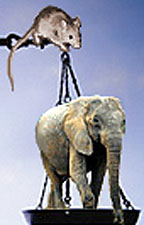 Mitch Ratcliffe says good stuff about how Xpertweb turns upside down the traditional relationship between buyers and sellers. Mitch Ratcliffe says good stuff about how Xpertweb turns upside down the traditional relationship between buyers and sellers."The buyer has needed to be wary since the Romans coined the phrase "caveat emptor" to excuse the seller of poorly made goods or poorly preserved foods. If you were too damned stupid to recognize that your fish sauce was spoiled, tough luck. What Xpertweb does, by flipping the process of a transaction around and making payment dependent on the delivery of quality and quantity promises (whether of stuff or services), is give us the potential for an economic system that both improves the seller's responsiveness to the customer and eliminates the free-rider problem that could afflict a system of payment after delivery.
Let's look at the concept of "Caveat Venditor" ("Let the vendor beware") and consider how it's time has come. For a long time, customer-centric business has been preached and promoted by business gurus, but it remains an ideal that, at best, is a promise easily erased by the liability and indemnification clauses of contracts, sales agreements and user agreements. Every time we relegate one party in a transaction to the role of "customer," they are left to wait for the proverbial shafting, even if it never actually comes. The Cluetrain Manifesto put this in plain words: "Companies must ask themselves where their corporate cultures" end and "If their cultures end before the community begins, they will have no market."
Caveat Venditor is the embodiment of the business guru babble. Walk the walk, don't promise something and expect the transaction to go silently into history. Xpertweb documents both sides of the transaction, creating a history and, by extension, an environment of trust. The first step toward this system has been in the pursuit of a new integrity in business and politics. Investors and citizens are convinced we need greater accountability in corporate disclosure and campaign finance reform, even if "leaders" mostly disagree, because it is their unbridled power at risk."
[ Organization | 2003-03-18 23:59 | | PermaLink ] More >
|
|
| Monday, March 17, 2003 |  |
|
|
|
 So, what is Xpertweb? In simple terms, it is a way for people to offer their services and products, for a suggested fee, or even for free if they choose, and for others to know with a high level of confidence what they can expect to get. Services are offered by arranging for certain files to be found on one's website. Files that identify you as a vendor of services, and that lists what products are available. The files are stored in a standardized XML based format. But at the same time they can be customized for the special needs this vendor has. The files are publically visible over the web. The software tools are open source. There is no centralized authority, no centralized storage place for the information. But it can be aggregated by anyone, in many inventive ways. And it can be validated by anyone, to verify that it is in a correct format and that it looks complete. So, what is Xpertweb? In simple terms, it is a way for people to offer their services and products, for a suggested fee, or even for free if they choose, and for others to know with a high level of confidence what they can expect to get. Services are offered by arranging for certain files to be found on one's website. Files that identify you as a vendor of services, and that lists what products are available. The files are stored in a standardized XML based format. But at the same time they can be customized for the special needs this vendor has. The files are publically visible over the web. The software tools are open source. There is no centralized authority, no centralized storage place for the information. But it can be aggregated by anyone, in many inventive ways. And it can be validated by anyone, to verify that it is in a correct format and that it looks complete.
There is then a standard protocol for carrying out a transaction. A prospective buyer/recipient of the offered service/product will select what he would like. He might go through some custom steps to negotiate options, scheduling, special requirements, etc. The customer places the order. The provider accepts the order. All information about all of this gets stored in a standardized, publically visible XML format. The information about all steps of the transaction gets stored on both the provider's and the customer's computers/servers.
The provider provides the service asked for. The customer rates how satisfied he is, on a percentage scale. If he is less than 50% satisfied, he will pay nothing. If he is more satisfied than that, he will pay in the ratio of his level of satisfaction. All of this information is stored with both the provider's and the customer's data. It is public. There are ways of checking whether anybody tampers with it.
This is an infrastructure for peer-to-peer economic interaction. Most important aspects about it, besides that there is no central control, is that everything is rated and everything is public. So, reputation becomes very important, and you can't fake it, because it is detectable when you do. Prospective customers can examine what previous customers experienced with a certain vendor. A vendor can examine what a customer's previous track record is. And they can decline on a given transaction.
Certain relationships are built-in. Both providers and customers have mentors, who both might act as helpful consultants in making this all work, but who also serve a function in letting their software verify and aggregate activity for the people they have sponsored. That introduces some checks and balances that makes the system more fault-tolerant, and that fosters synergetic relationships.
It all doesn't exist yet. But Britt Blaser has spent several years thinking it through in great detail, and building prototypes. Now it just needs to be made as simple, compelling, transparent and bullet-proof as possible. Some data structures need to be finalized. Some initial sample software needs to be written. It needs to be tried out with real people.
It might be huge.
[ Organization | 2003-03-17 23:59 | 0 comments | PermaLink ]
|
|
| Monday, March 10, 2003 |  |
|
|
|
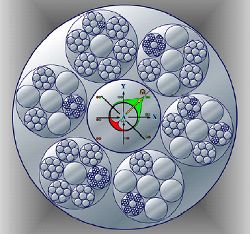 Timothy Wilken writes in Dymaxion: Doing More with Less: Timothy Wilken writes in Dymaxion: Doing More with Less:"When we examine the biological needs of a number of single celled organisms surviving as individuals versus the needs of the same number of cells working together within the body of an organism, we find the cells working together are able to reduce their biological needs by 100 to 1000 times. The bodies of all living systems are organized synergically. That means the cells work together and solve the problems of survival as a unified team. Imagine, what could be possible if the entire human species were a single organization. The synergic strategies of Ortegrity could be used to organize all of humanity into a single level 12 Ortegrity up to a limit of 13,841,287,201 humans. In our present world, with its obsession with growth and growing larger, whenever I have presented the Ortegrity to business people, they have been excited by the possibility of increasing production. However, they tend to overlook the point that these systems could be 100 to 1000 times more efficient. Now being more productive doesn't mean you have to produce more. It also means you could produce what you need in less time and then have more time for yourself and your family. Being more efficient means you can do with a lot more with less energy and matter. ...What this efficiency means is that the ecological footprint of 6 billion synergically organized humans could be as low as that of 60 million to 6 million of today's adversary-neutrally dis-organized humans." I believe that. Of course we need to be organized synergetically. And, for that matter, I don't think we inherently need to have ANY footprint. The rest of nature recycles everything. Timothy is inspired very much by Bucky Fuller and Alfred Korzybski, who are two of my heroes as well. There's a whole book in that Ortegrity link, with lots of neat stuff. "Ortegrity" refers to a way of organizing, supposedly scalable to the size of humanity. I don't quite understand it, even after looking over the document. And, well, despite that I agree in the aim of helping humanity self-organize in a synergetic way, I'm very skeptical of any scheme that involves numbers that are too neat. You know, people work together in group of so-and-so many, that are part of bigger structures with so-and-so many elements. And I'm skeptical of the intention to avoid conflict. There is productive conflict and unproductive conflict. Personally I enjoy having a good argument once in a while, and I think more gets done if there's a healthy element of competition. Synergy doesn't mean lack of conflict in my book.
[ Organization | 2003-03-10 21:52 | | PermaLink ] More >
|
|
|
|
Ton Zijlstra says a lot of good stuff about knowledge sharing and blogs, like here and here."Sharing knowledge is where a storyteller recounts a story that is particularly relevant to the listener at this time, otherwise it would fall on deaf ears, and no sharing would take place, only broadcasting. Knowledge sharing takes place in dialogues, wether in real time or not, where all parties take on the role of both story teller and listener. In practice this is not often a clear cut case: I acquire knowledge by listening to different storytellers, with knowledge sharing moments on parts of the eventually obtained knowledge. Knowledge sharing is sort of information bartering.
From any piece of knowledge I cannot describe who shared it with me: it is the resulting amalgam of all information inputs on a certain subject, of listening to multiple storytellers. Sometimes I can name influential sources, sometimes I cannot. Learning is mostly a voyage of discovery, a journey of listening, where only in the end, not along the way, I might have something to say on what brought me to my goal. It is an evolutionary process, with no clear view of what will be the red thread and what will be dead-end sideroads at the start. What can help me along on my road of discovery is relationships, storytellers who can point to other storytellers." Also, look at the KnowledgeSharing wiki page started by Denham Grey.
[ Organization | 2003-03-10 19:07 | | PermaLink ] More >
|
|
|
|
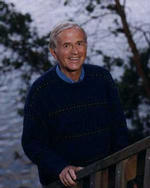 Dee Hock sent a fascinating e-mail to Joi Ito, commenting on emergent democracy, blogging, power and other interesting things. Dee Hock is the father of chaordic thinking, and the guy who created the VISA organization. And this is delightfully subversive stuff. Dee Hock sent a fascinating e-mail to Joi Ito, commenting on emergent democracy, blogging, power and other interesting things. Dee Hock is the father of chaordic thinking, and the guy who created the VISA organization. And this is delightfully subversive stuff." It is futile to directly challenge such institutions, political or commercial, for they have an oligopoly on power, money and instruments of compulsion. Nor do they hesitate to use them if threatened. However, they will prove to be vulnerable, rusted out hulks if confronted with new and better ideas of organization which transcend and enfold them. Ideas that excite the very people they expect to remain passive. What they cannot resist is the searchlight of informed public opinion. Once the public begins to withdraw relevance from them they are helpless, as Gandhi so ably demonstrated in India. While I don't begin to understand Blogging, your paper set something turning in the back of my mind that whispers it may be one of the keys to the puzzle.
I wonder if you realize that a dozen or two people like yourself with the right combination of communication, technological and organizational skills could design and implement a global government without the consent of any present form of organization and provide it with the neural network to insure its success. A government that could continually evolve to ensure that no matter affecting the public good or the health of the planet fails to be disclosed, examined and understood. Or that any existing organization could escape being confronted with synthesized opinions and alternatives that would swiftly emerge. Such an organization based on rights of participation and withdrawal and consent of the participants could be something entirely new in this tired world. Now that would be something truly worthy of the best within us and the best among us." He's not talking about a traditional government, you know, that wields power over people. What he's saying is that a few dozen dedicated people with fairly modest funding could change everything, by setting up a system that analyzes and understands all matters and activities important to society, and shares the information openly and widely, so that people can make informed decisions by themselves, based on the truth. He's right. Everything would change. I think that is an extremely profound vision and observation, and a very worthy goal.
[ Organization | 2003-03-10 18:02 | | PermaLink ] More >
|
|
| Saturday, March 8, 2003 |  |
|
|
|
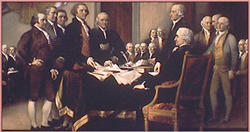 Joi Ito has an emergent democracy brainstorm with John Vasconcellos and friends. Joi Ito has an emergent democracy brainstorm with John Vasconcellos and friends."The discussion was quite fascinating. We started talking about the republic and representative democracy. It was pointed out (sorry, I took notes, but not always about who said what....) that the republic was not formed for the sake of efficiency but out of a more elitist attitude that certain people were more fit to govern and that it would be impossible for an uneducated mob to rule. In that sense, it really wasn't just a more efficient democracy. I asked John what he thought about the current representative democracy and he said, 'not functioning well, but functioning barely'. He said the people are 'so busy, distracted and spoiled'. I agreed with them that a direct democracy in our current environment was not feasible, but that maybe our thoughts on emergent democracy might, in the short term, be a great tool for supporting a the 'not functioning well, but functioning barely' representative democracy that we have today." Very interesting point there about representative democracy in the form of a republic, like in the U.S. It isn't to allow the people to decide. It is to remove the mob from deciding. However brilliant and freedom minded the fathers of the U.S. Constitution were, it wasn't direct democracy they had in mind. So, it is time for something altogether new.
[ Organization | 2003-03-08 22:25 | | PermaLink ] More >
|
|
|
|
 New functional kinds of democracy is one of my primary interests. How can groups of people work out how to organize themselves and act collectively, in a way that serves all the present needs, rather than just serving the lead of an elite, elected or not. Tom Atlee is somebody who has gathered more resources in that field than anybody else I know. This document, which is a couple of years old, is a call for a movement to arise, a movement towards a new kind of democracy. It is based on a series of assumptions, which I for one share wholeheartedly: New functional kinds of democracy is one of my primary interests. How can groups of people work out how to organize themselves and act collectively, in a way that serves all the present needs, rather than just serving the lead of an elite, elected or not. Tom Atlee is somebody who has gathered more resources in that field than anybody else I know. This document, which is a couple of years old, is a call for a movement to arise, a movement towards a new kind of democracy. It is based on a series of assumptions, which I for one share wholeheartedly:1) Differences are a resource for the generation of wisdom, solutions and possibilities.
2) Tapping the richness of diversity requires good attention to process.
3) People who care about something are a special resource for handling it.
4) Properly facilitated dialogue among diverse stakeholders can produce understandings and programs on which they can all agree.
5) A small group (1-5 dozen people) who have been selected (randomly or scientifically; not politically) to represent the diversity of a larger population can, through appropriately facilitated deliberation, generate real wisdom about complex issues on behalf of that larger population.
6) Those who will be affected by a decision should be able to play an informed and appropriate role in shaping that decision.
7) The systems we live in (cultures, institutions, media, power relations, infrastructures, etc.) are among the most profound influences on our consciousness and behavior. Efforts to change a society's consciousness and behavior require changes in systems.
8) The political and governmental systems we have now are not working. In fact, they play a significant role in generating our growing collective problems (even catastrophes).
9) Any positive evolution of democracy will be grounded in collaboration, our common humanity, respect for diversity, and/or our understanding of holism and living systems theory.
10) Such evolution of democracy is of the highest importance. Without it, our circumstances will likely grow increasingly dire. With it, every other public issue will be more readily resolved. This is where the leverage is. And Tom continues by suggesting it will take some movement building action by people who share those assumptions, in the form of gatherings, websites, journals, books, study circles, networking and financing.
[ Organization | 2003-03-08 21:33 | | PermaLink ] More >
|
|
| Thursday, March 6, 2003 |  |
|
|
|
Joi Ito:"Had dinner tonight with Lawrence Lessig to talk about emergent democracy and other things. Larry pointed out some interesting work called deliberative polling being done by Professor James S. Fishkin. Since polling is forces people to vote on something they don't really know too much, the data may be statistically accurate, but is not necessarily the best way to promote a democratic system. deliberative polling takes a diverse group of people, forces them to discuss the issues in small group, in large groups, small groups, over and over again for a fairly lengthy process until everyone has a pretty good idea of the issues and an balanced and eductated position. Polls are conducted through the process to track how people's opinions change. Afterwards, many of the people who have participated become much more active citizens. I think that this is similar to the emergent democracy idea that we have. Maybe we can try to do this deliberative polling using the online tools that we have." Hm, interesting. Makes me think of Citizen Deliberative Councils. And wasn't it the Roman senate that picked regular citizens for its members on a rotating basis, whether they wanted to or not? There's something to say for bringing together a random cross-section of people, and hearing what they come up with, once they study the issues at hand. As opposed to career politicians and lobbyists trying to decide everything."Deliberative polling turns to the representatives to execute on these opinions. Antoin was the first to point out (many others have pointed this out later) that my paper misses an important part of the democratic process. The execution. It focuses on the deliberation part. Maybe emergent democracy should focus on those interesting moments in history where the people wake up and change government. Larry talked about how there were three such instances in the US. When the framers went against the bill of rights in writing the constitution, during the civil war and during the "new deal." Each of these involved a deviance from constitutional democracy because of a huge swell in the opinion of the people. Maybe emergent democracy enables the people to force an issue when it become important enough to engage the public to rise up. Sort of an information militia. We can rely on the experts in the representative democracy when this are running smoothly and the people are not engaged... Anyway, still very malformed thoughts, but a lot to think about." Yes, of course, the action. There's something screwed up about deciding things in a disconnect from the action required to do it. That's again often what politicians do. Maybe real democracy is inextricably intertwined with action. Maybe it is what people choose to DO, if they're free to do so.
[ Organization | 2003-03-06 23:59 | | PermaLink ] More >
|
|
|
|
Andrius Kulikauskas is a champion for working openly. Read his new bigger and bolder proposal for the operation of the Minciu Sodas laboratory. The idea is to publically propose projects, to make clear which people are available, what they're available for, and how much money is needed. Because it is all public, and because people can follow the progress, anybody can provide information and leads that might make projects come together. He outlines a scheme with a range of bigger and smaller projects supporting each other. Oh, and I'm delighted to see a slot waiting for me there. Yes, of course I'd enjoy making knowledge management systems with such distinguished folks.
[ Organization | 2003-03-06 23:59 | | PermaLink ] More >
|
|
|
|
David Weinberger and Doc Searls have written an article about what the Internet is and what it isn't. It presents some powerful and simple points that need to be spelled out in neon, for all those who don't quite get it. Maybe not you and I, but maybe the phone company and the recording industry and the government. And you're hearing it from two of the four authors of the Cluetrain Manifesto."All we need to do is pay attention to what the Internet really is. It's not hard. The Net isn't rocket science. It isn't even 6th grade science fair, when you get right down to it. We can end the tragedy of Repetitive Mistake Syndrome in our lifetimes — and save a few trillion dollars’ worth of dumb decisions — if we can just remember one simple fact: the Net is a world of ends. You're at one end, and everybody and everything else are at the other ends.
Sure, that’s a feel-good statement about everyone having value on the Net, etc. But it’s also the basic rock-solid fact about the Net's technical architecture. And the Internet’s value is founded in its technical architecture.
Fortunately, the true nature of Internet isn’t hard to understand. In fact, just a fistful of statements stands between Repetitive Mistake Syndrome and Enlightenment ..."
[ Organization | 2003-03-06 23:59 | | PermaLink ] More >
|
|
| Tuesday, March 4, 2003 |  |
|
|
|
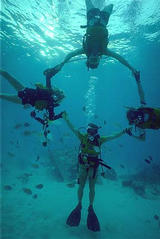 Long article from Timothy Wilken on synergetic wealth and synergetic consensus. Long article from Timothy Wilken on synergetic wealth and synergetic consensus."If we humans synergically reorganized our world, we would all be wealthy beyond our wildest dreams. Today in 2002, if we were to reclaim the gift of all the land and natural resources presently held on planet Earth as individual property. And if we were to further reclaim the gift of Progress from those few who control it today, and then divided these two gifts equally among the 6 billions of us living on the planet, we would discover to our surprise and amazement that every man, woman, and child is wealthy beyond their dreams.
With synergic organization, and careful utilization of the planet’s total wealth for the benefit of all humanity, the carrying capacity of the Earth could be maximized to solve all our human problems and meet our all our needs. And this is without any need to damage the Earth, or degrade our environment.
There would never be any need for humans to earn their livings again. Our livings have already been earned by all those humans who lived and died to give us the great gift of progess. Then all humans would be free to spend their time making their lives meaningful by creating more wealth to be gifted to living and future humanity." And I agree. There's resources enough on this planet for everybody to live affluently, if those resources weren't squandered and hoarded so much. And the resources could be used in collaboration and in harmony with the planet, rather than in the adversarial relationship that exists now. But it would require a dramatically different way of thinking about things, and a dramatically different way of organizing ourselves. Timothy also talks about what he calls 'Unanimous Rule Democracy', which is very much how I think democracy should work as well. Not rule by the majority, not rule by a dictator, not rule by whoever is first or fastest or richest, but unanimous consensus. Which is something we don't see much of in our current society."Synergic consensus is not availability to humanity today. We do not yet know how fast it will be at making decisions. But, I predict that unanimous rule democracy will prove faster than majority rule democracy. Synergic consensus elimates conflict. Recall conflict is the stuggle to avoid loss. Conflict is at the very heart of majority rule democracy. The focus of synergic consensus is very different. The entire group knows from the outset that they cannot lose. They are focused on choosing a plan of action that serves the needs of all the members in the group—to choose a plan of action that causes no one to lose. The synergic veto is not invoked capriciously. The only basis for synergic veto is to prevent someone from losing. This is a mechanism to eliminate loss—to choose the very best plan of action for everyone. This may well speed up the process of decison making. In any event regardless of the speed of decision, implimentation will be rapid. There is no conflict. This is a major advantage over majority rule democracy." I'm wondering how to demonstrate that, even on a small scale. More on that at another time.
[ Organization | 2003-03-04 17:23 | | PermaLink ] More >
|
|
<< Newer stories Page: 1 2 3 4 5 6 7 8 Older stories >> |

